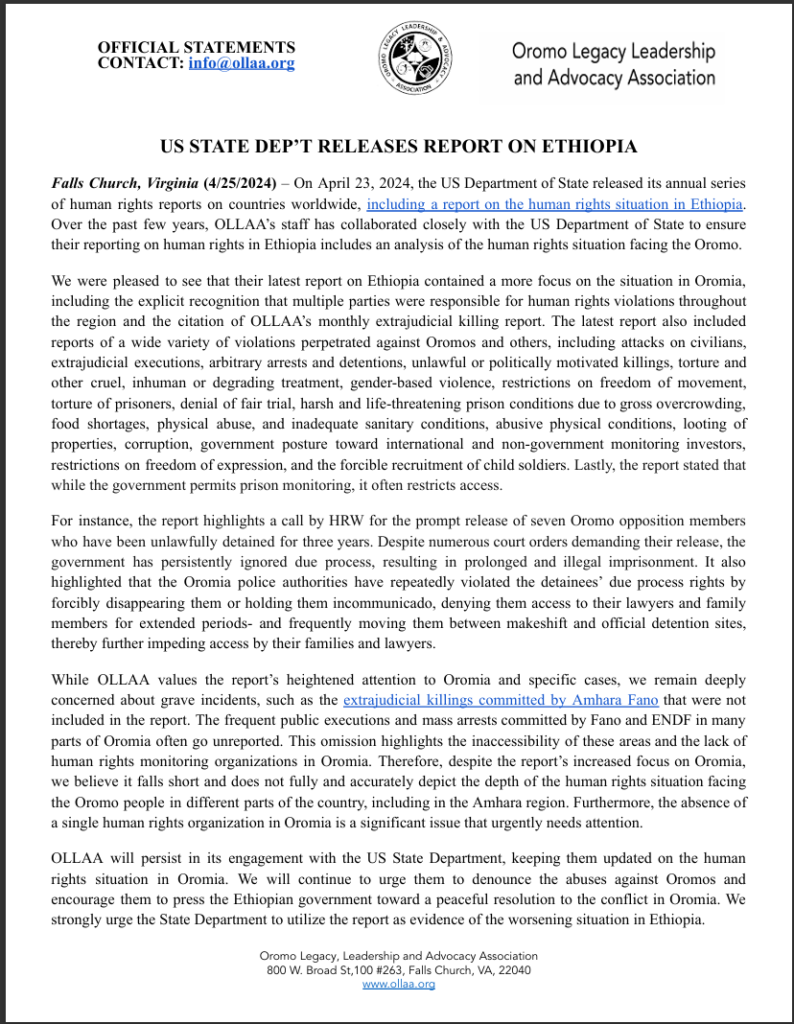Falls Church, Virginia (4/25/2024) – On April 23, 2024, the US Department of State released its annual series of human rights reports on countries worldwide, including a report on the human rights situation in Ethiopia. Over the past few years, OLLAA’s staff has collaborated closely with the US Department of State to ensure their reporting on human rights in Ethiopia includes an analysis of the human rights situation facing the Oromo.
We were pleased to see that their latest report on Ethiopia contained a more focus on the situation in Oromia, including the explicit recognition that multiple parties were responsible for human rights violations throughout the region and the citation of OLLAA’s monthly extrajudicial killing report. The latest report also included reports of a wide variety of violations perpetrated against Oromos and others, including attacks on civilians, extrajudicial executions, arbitrary arrests and detentions, unlawful or politically motivated killings, torture and other cruel, inhuman or degrading treatment, gender-based violence, restrictions on freedom of movement, torture of prisoners, denial of fair trial, harsh and life-threatening prison conditions due to gross overcrowding, food shortages, physical abuse, and inadequate sanitary conditions, abusive physical conditions, looting of properties, corruption, government posture toward international and non-government monitoring investors, restrictions on freedom of expression, and the forcible recruitment of child soldiers. Lastly, the report stated that while the government permits prison monitoring, it often restricts access.

For instance, the report highlights a call by HRW for the prompt release of seven Oromo opposition members who have been unlawfully detained for three years. Despite numerous court orders demanding their release, the government has persistently ignored due process, resulting in prolonged and illegal imprisonment. It also highlighted that the Oromia police authorities have repeatedly violated the detainees’ due process rights by forcibly disappearing them or holding them incommunicado, denying them access to their lawyers and family members for extended periods- and frequently moving them between makeshift and official detention sites, thereby further impeding access by their families and lawyers.
While OLLAA values the report’s heightened attention to Oromia and specific cases, we remain deeply concerned about grave incidents, such as the extrajudicial killings committed by Amhara Fano that were not included in the report. The frequent public executions and mass arrests committed by Fano and ENDF in many parts of Oromia often go unreported. This omission highlights the inaccessibility of these areas and the lack of human rights monitoring organizations in Oromia. Therefore, despite the report’s increased focus on Oromia, we believe it falls short and does not fully and accurately depict the depth of the human rights situation facing the Oromo people in different parts of the country, including in the Amhara region. Furthermore, the absence of a single human rights organization in Oromia is a significant issue that urgently needs attention.
OLLAA will persist in its engagement with the US State Department, keeping them updated on the human rights situation in Oromia. We will continue to urge them to denounce the abuses against Oromos and encourage them to press the Ethiopian government toward a peaceful resolution to the conflict in Oromia. We strongly urge the State Department to utilize the report as evidence of the worsening situation in Ethiopia.
OLLAA is an umbrella organization that works in collaboration with dozens of Oromo communities around the world.

